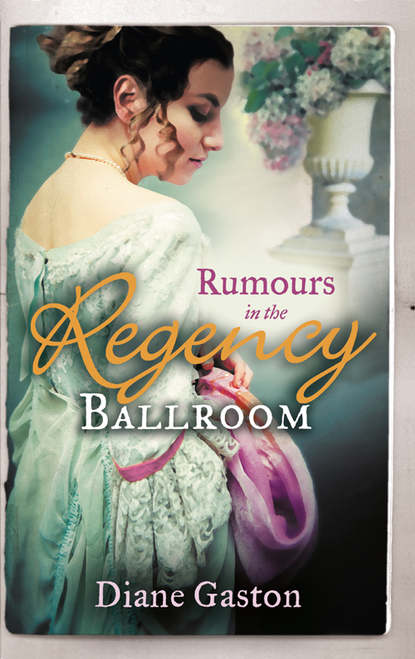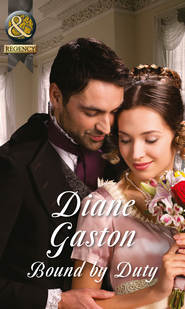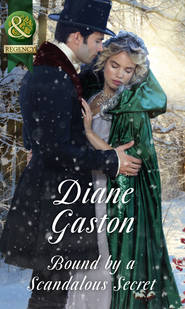По всем вопросам обращайтесь на: info@litportal.ru
(©) 2003-2024.
✖
Rumours in the Regency Ballroom: Scandalising the Ton / Gallant Officer, Forbidden Lady
Настройки чтения
Размер шрифта
Высота строк
Поля
Mary beamed. “Well, I am very happy and that is the truth.”
Lydia reached out and touched the girl’s hand. “And I am happy for you.”
Lydia turned to walk down the stairs. As she descended she heard Mary’s cheerful tune again and almost felt like humming herself.
But a wave of queasiness came over her, so strong she almost missed a step. She grasped the banister to keep from falling.
She’d had such a feeling before, but that had been when she—
No. It could not be. It must not be.
“I’m hungry, that’s all,” she said aloud, although the thought of food made her stomach roil again. She pressed a hand to it and walked more slowly to the morning room.
She glanced at the food set out on a little table in a spot where the sunlight shone in from the window. The fare was simple. A pot of chocolate, a cooked egg, toast and jam, but her stomach rebelled at the sight. She took deep breaths and walked over to the window to wait for the nausea to subside.
There were still plenty of coaches rumbling by to entertain her. From this window it was easier to see the crests on the sides of the carriages. She recognised some of them. They were numerous enough to form a queue on her street, all waiting for the traffic to clear at South Audley Street, she supposed.
A fine shiny black town carriage came to a stop directly in front of her house. She examined the crest, but did not know to whom it belonged. Her gaze lifted to the window of the carriage. There staring back at her was Adrian. He nodded to her, and she quickly stepped back out of sight.
“By Jove, I believe that is Lady Wexin at the window.” Adrian’s father leaned over him to see better, but Lydia had already disappeared. “Did you see her?”
“I was not looking at the windows,” Adrian lied.
He’d seen her. His stomach muscles had clenched when his eyes met hers, like some besotted whelp in his first infatuation, but she’d quickly stepped away when he acknowledged her.
The message was clear. She had no wish to see him, even by accident.
“I am certain it was she.” His father leaned over him to get another look, but Adrian could have told him she would not show herself again, not while their carriage stood in front of her house. “Cannot mistake her. She is a beauty, that one. Can see why Wexin wanted her.”
“Mmm,” responded Adrian, not wishing to encourage this turn in their conversation.
It was merely his vanity that was wounded when she did not smile at him or nod in return, nothing more. Besides, not every woman he met wanted him. Why would they? He did not want every woman he met, including Lady Denson, the widow who seemed to appear at any society affair he attended.
“Did you hear?” His father chuckled. “Bets have been placed in White’s book on the identity of this Lord C who was connected with Lady Wexin in the newspapers.”
Adrian glanced over at him in surprise. “Indeed?” He’d hoped the story would have been forgotten in the wake of the Queen’s death.
His father lifted a finger. “Odds are on Crayden, you know.”
“Crayden?” Adrian should have been glad his father had not named him, but why Crayden, who was an impoverished Irish Viscount?
His father shrugged. “Word is he was a suitor of hers before Wexin. Never married. Needs the money from her dowry and a rich father-in-law as much as Wexin did.”
It ought not to matter to Adrian, but this news depressed him, even though he knew he was the Lord C of The New Observer’s story. He also knew her financial situation was not likely to attract Crayden, if the man knew of it, that is.
Betting on her at White’s didn’t please Adrian either. He disliked this manner of attention on her. She did not deserve it. Wexin had been the villain, not Lydia.
Adrian had discovered that Lydia had hired back most of her servants. Or rather his valet had discovered it at Adrian’s request. He had no idea how his man had accomplished it, but within a day Hammond had produced the information of how many servants had been dismissed originally and how many had returned. The number was sufficient to ensure her comfort.
He leaned back against the padded upholstery, trying to feel some satisfaction in having helped her.
The coach lurched forwards, the unexpected motion causing both father and son to grip the seats.
His father frowned. “I do hope the springs in this carriage are up to a trip of this length. I do not relish being jostled about.”
This was Adrian’s first ride in the elegant carriage bearing the Earl of Varcourt’s crest. “It is a damned sight better than the last hack I rode in.”
His father huffed. “Why you ride in those things is a mystery to me. Our old coach is at your disposal any time you require it.”
“That is generous of you, sir.” Adrian’s father was always generous.
This carriage did have a tendency to sway to and fro in a manner as lulling as a ship in gentle waters. After leaving the busy streets of London, they lapsed into silence. His father dozed and Adrian lost himself in thoughts that seemed as unfocussed as his life. The day promised to be long and tedious, but it was their duty to be present at the Queen’s funeral.
“When duty calls, a gentleman must always rise to do what is required of him,” his father always said. And always added, “So enjoy life while you can, my son.”
His father would deny it, but Adrian knew he relished doing his duty in whatever form it took, and probably had enjoyed it even from his youth, when he inherited the family title. Adrian’s father was a man who could be counted upon to do what must be done, but he also tended to glorify what he’d missed, the chance to be a frivolous, pleasure-seeking youth. His father could not fathom how such trivialities could grow tiresome over time.
When they reached Kew Palace there was a jumble of carriages, cavalry and foot soldiers, royal grooms and pages. Also in attendance were the royal physicians and countless other members of the royal entourage. Somehow this multitude sorted itself into a dignified and orderly procession, moving solemnly towards Windsor and St George’s Chapel.
The procession kept its snail-like pace the whole distance, reaching Houslow Heath shortly after noon and the chapel at seven in the evening. By that time most of the London carriages had turned off, making their way back to town. It was appalling how few peers actually endured the day long enough to attend the Queen’s funeral service.
Adrian and his father endured it, as duty demanded. By the time their coach was again pointed in the direction of London, his father’s energy had flagged and his rhythmic snores joined with the sound of the horses’ hooves and the creaking of the coach’s springs.
Adrian stared at the darkness outside, alone again with his thoughts.
What was there to look forward to in the weeks ahead? Within days London would empty, the ton fleeing to country houses or the Continent, places where they might find entertainment. With the official mourning of the Queen, the London entertainments would disappear. The theatres were already dark, and no one had hosted a ball or dinner or rout since the mourning commenced.
Adrian supposed he could accept his mother’s invitation to spend Christmas at the Varcourt estate. No doubt several of his parents’ friends would be in attendance. There would be card playing at night and perhaps he could ride in the mornings. There would be plenty of land to give his horse a good run.
Tanner had invited him to Tannerton, as well, but Adrian had already begged off. He knew Tanner would prefer to be alone with his new wife.
Perhaps he should travel somewhere, somewhere like…Paris.
Yes. Paris would be a novelty. Things were a bit gayer there now than they had been right after the war, he’d heard. More money was pouring in to the city each day. There were plenty of casinos he might visit, as well as the various sites of interest in the city.
Yes, he made the decision. He would go to Paris.
Anywhere to battle this cursed ennui.
Chapter Seven
The notorious Lady W—has gone back into hiding, no longer venturing to visit the shops on Piccadilly or to take walks in Hyde Park. All of London wishes to know why. Could she perhaps be in an interesting condition?—The New Observer, April 11, 1819
Adrian sat in the dining room at the townhouse on Curzon Street. While he’d been in Paris, his father had written to him that the Pomroy house would be ready for him on his return. Adrian made arrangements for his belongings to be moved from his rooms near St James’s Square, and wrote to tell the servants at the townhouse when to expect him. He’d entered the house he’d known as a child, just the day before this one. It continued to be a curious combination of familiar and strange. Adrian had slept in the room and on the bed he’d always known as his father’s and was now seated at the head of the long dining-room table in what seemed like his father’s chair.
His family’s butler, a man hired by his father years ago, entered the room. “The newspapers, my lord.” The butler even addressed Adrian in the same tone he’d always addressed Adrian’s father.
“Thank you, Bilson.” Adrian tried at least to sound like himself. He returned his coffee cup to its saucer and took the papers in hand.











